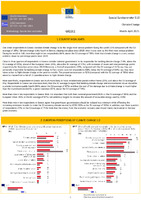| dc.description.abstract | One in ten respondents in Greece consider climate change to be the single most serious problem facing the world (10% compared with the EU average of 18%). Climate change ranks fourth in Greece, slipping one place since 2019, when it was seen as the third most serious problem facing the world in. Still, more than eight in ten respondents (84%, above the EU average of 78%) think that climate change is a very serious problem, down six percentage points since 2019.Close to three quarters of respondents in Greece consider national governments to be responsible for tackling climate change (74%, above theEU average of 63%), ahead of the European Union (65%, above the EU average of 57%), with increases of seven and nine percentage points respectively for these two actors since 2019. Moreover, a third of respondents (33%, compared with the EU average of 41%) say they are personally responsible for tackling climate change. In fact, nearly six in ten respondents (58%, below the EU average of 64%) say they havetaken action to fight climate change in the past six months. This proportion increases to 92% (compared with the EU average of 96%) when asked to choose from a list of 15 possible actions to fight climate change.More specifically, respondents in Greece are much more likely to have installed solar panels in their home (20%, well above the EU average of 8%). Respondents in Greece are also more likely than the EU average to agree that tackling climate change and environmental issues should bea priority to improve public health (94%, above the EU average of 87%) and that the cost of the damage due to climate change is much higher than the investment needed for a green transition (85%, above the EU average of 74%).More than nine in ten respondents in Greece think it is important that both their national government (91% vs the EU average of 88%) and the European Union (91% vs the EU average of 87%) set ambitious targets to increase the amount of renewable energy used by 2030.More than nine in ten respondents in Greece agree that greenhouse gas emissions should be reduced to a minimum while offsetting the remaining emissions in order to make the EU economy climate-neutral by 2050 (92% vs the EU average of 90%). In addition, over three quarters of respondents (77% vs the EU average of 75%) think that the money from the economic recovery plan should mainly be invested in the new green economy. |

